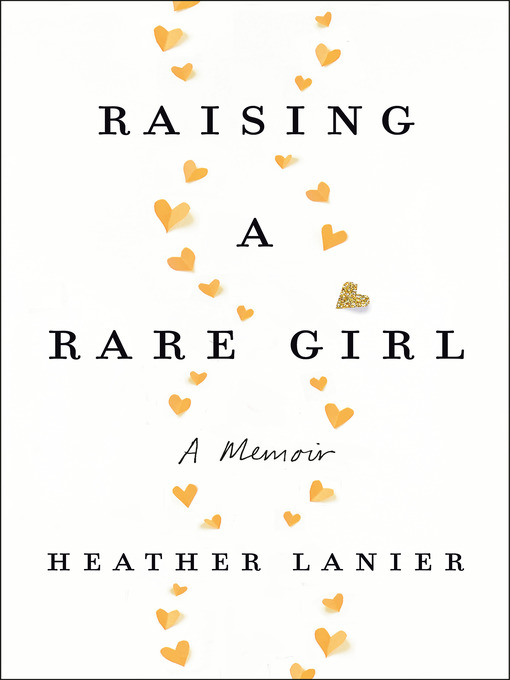
Raising a Rare Girl
A Memoir
کتاب های مرتبط
- اطلاعات
- نقد و بررسی
- دیدگاه کاربران
نقد و بررسی

April 13, 2020
In this moving and insightful memoir, poet Lanier (The Story You Tell Yourself) shares her experiences as the mother of a child born with a rare chromosomal disorder. At the age of 32, Lanier becomes pregnant with her and her Episcopalian-priest-in-training husband’s first baby. She writes candidly of wanting to give birth to a “superbaby,” and during her pregnancy she strives to be healthy in order to produce a perfect child. But the baby, Fiona, is born weighing less than five pounds, and by her three-month checkup still resembles a newborn. She’s soon diagnosed with Wolf-Hirschhorn syndrome, which can lead to intellectual disability and the inability to walk or speak. After the author’s husband gets a post at an Episcopal church and the family moves from Ohio to Vermont, Lanier spends her days working with Fiona and various therapists, seeking to find the best ways to meet Fiona’s needs and help her learn to communicate. Lanier struggles with the attitudes of physicians and others who regard her daughter as “damaged” and beautifully details her own acceptance as well as the development of her special needs child (in time, Fiona walks, speaks with the help of a communication device, and attends public school). This intimate, powerful memoir will resonate with parents, whether of “superbabies” or not.

May 1, 2020
A poet and creative nonfiction professor grapples with motherhood and the meaning of life in this memoir of raising her developmentally challenged daughter, Fiona. As Lanier notes at the beginning, she had followed all the best-practices advice throughout her pregnancy--organic fruits and vegetables, no GMO, maintaining a seated position leaning forward with "my elbows propped on my spread knees like I was forever on the verge of imparting a proverb"--to make certain that hers would be a "SuperBaby." But Fiona was born with the extremely rare Wolf-Hirschhorn syndrome, which has profound developmental affects relative to mental growth, speech, coordination, and other areas. It has a high youthful mortality rate, and "there is no specific treatment." The author struggled mightily to cope with the severity of the diagnosis: "I was free-falling....My sadness was no longer the selfish reaction that my baby wasn't, would not be perfect, but that we could lose her....My cry was an emptying....My cry was a collapse." Lanier writes with powerful humanity as she charts her course, and one of the first lessons she learned was that when anyone chooses to have a child, they "sign up for the fragility of life." The author is especially sharp on her journey to remake herself, to pivot away from "the desperate, clinging, distraught version who wanted what her child was not." Along the way, she forcefully condemns the concept of a hierarchy of lives worth living. Her abiding love for Fiona is clear throughout, and it's heartening to watch her learn to reject the idea that disability is deficit. "We can only open our arms, say welcome," she writes, and she is clear that this means being vulnerable, "often fallible, but always open, and raw, and real. And present to the whole messy world." A book of pluck, spirit, and great emotion with an appealing perspective on the value of each human life.
COPYRIGHT(2020) Kirkus Reviews, ALL RIGHTS RESERVED.

May 15, 2020
This is an intensely reflective and honest account of the author's first five years with her daughter, Fiona, who was born with Wolf-Hirschhorn syndrome, a rare genetic variation. Lanier was exceptionally careful during her pregnancy. She followed medical advice and prepared herself spiritually, hoping to have a super healthy baby. When full-term but tiny Fiona was born, Heather and her husband (a Buddhist, Episcopalian priest, and ex-Catholic monk) were unprepared for the devastating prognosis: probable intellectual disability, seizures, failure to thrive, lack of ability to talk or walk, and a 30 percent mortality rate. As readers follow Fiona's precarious first years, Lanier candidly explores her evolving emotions: guilt, despair, grief, acknowledgment of ingrained parental competitiveness, and questioning of what constitutes normal. She also documents her dealings with doctors, specialists, and therapists, whose interventions range from innovative solutions to advice for institutionalization. Readers share moments of anguish, terror, laughter, and triumph, as feisty Fiona grows and conquers milestones in her own unique ways. The book ends as Fiona enters Kindergarten, confident, quirky, and rare, indeed.(Reprinted with permission of Booklist, copyright 2020, American Library Association.)

September 1, 2020
"Rare children" are children diagnosed with a disease that affects less than five percent of individuals. Lanier's (The Story You Tell Yourself) daughter Fiona was diagnosed with Wolf-Hirchhorn Syndrome, a disorder that affects only one in 50,000 people. From her complicated feelings when seeing able-bodied babies to her anxiety during her subsequent pregnancy, the author chronicles the many struggles in raising a "rare girl." Yet Lanier also shares the joys of discovering her child's hidden love for music and propensity for clapping and her elation when Fiona learned to nod, increasing communication among family members. VERDICT Lanier's memoir will resonate with a wide range of readers.
Copyright 2020 Library Journal, LLC Used with permission.

























دیدگاه کاربران